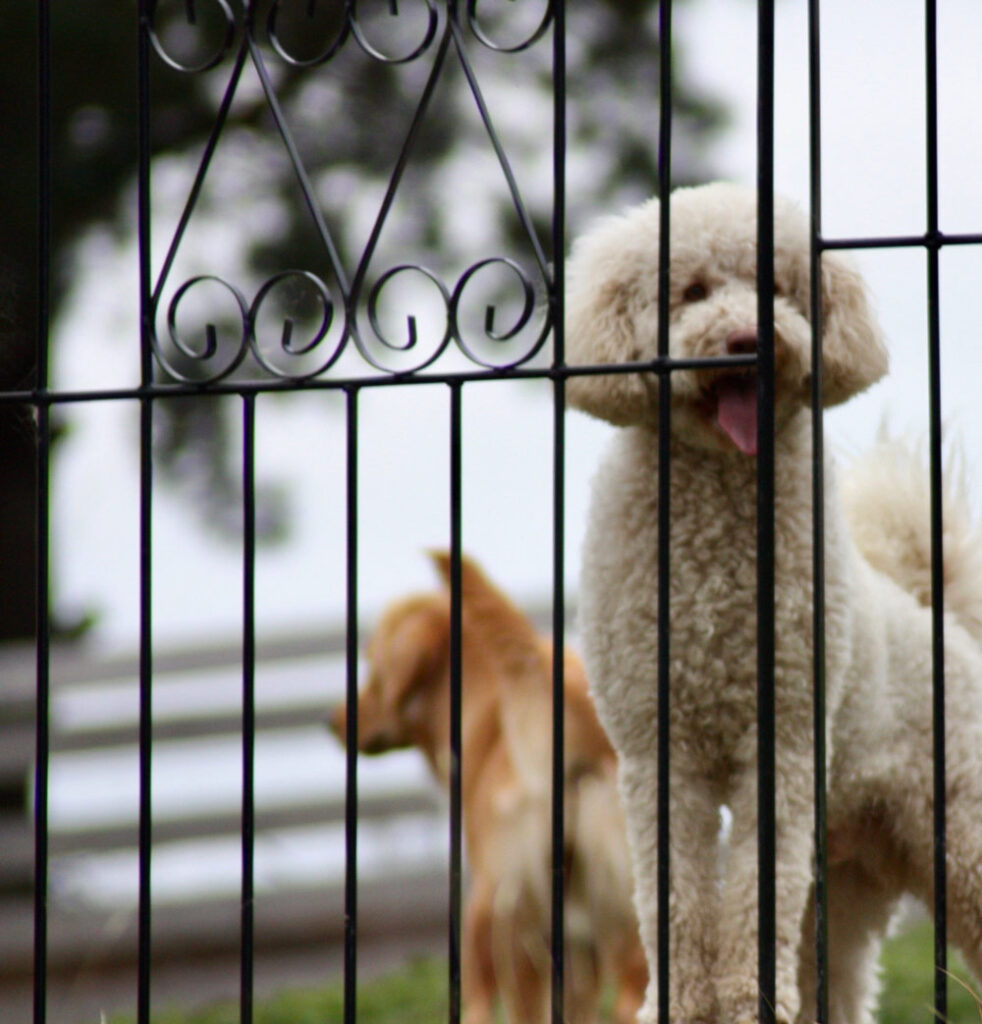
What We Do
Dog Breeding at Coffee Kennels: A Family-Owned Ethical Pet Breeding Facility
At Coffee Kennels, we take great pride in providing top-notch dog breeding services that prioritize the well-being of our furry friends. Our family-owned facility is located between Castlemaine and Kyneton in Victoria, and we're dedicated to making sure our dogs receive the love, care, and attention they deserve.
Responsible and ethical breeding
Unlike many typical breeding facilities that house dogs in cramped, concrete pens, we offer large grassed areas where our dogs can play and run around. Our dogs are a crucial part of our family, so they sleep inside our house at night in a comfortable and safe environment. We also provide them with a 44m square exercise yard where they can socialise with other dogs and get plenty of fresh air.
When it comes to the health and well-being of our dogs, we leave no stone unturned. All of our dogs are fully vaccinated and wormed, and we take extra precautions to make sure our female dogs are healthy both before and after pregnancy. Our male dogs are also yearly vet checked to make sure they are producing healthy pups.
At Coffee Kennels, we believe in responsible and ethical breeding practices. All of our breeding dogs have been DNA tested and are free from any breed-specific genetic defects. Our Golden Retrievers have above-average hip scores, and our Poodles are checked by a canine ophthalmologist to make sure there’s no PRA present. We take these steps to ensure that only the healthiest pups leave our facility.
We’re proud members of The Australian Association of Pet Dog Breeders and registered breeders with Mount Alexander Council. Our commitment to quality breeding is evident in our yearly audits from a vet and local ranger. At Coffee Kennels, we’re always striving to improve our facilities and breeding process, so our dogs can continue to receive the best possible care.
From constant socialisation to air-conditioned comfort during pregnancies, we make sure our puppies are well-adjusted and ready to be a loving addition to their new family. Our commitment to ethical and responsible dog breeding is evident in everything we do, and we’re proud to offer the highest-quality services for your furry friends.
FAQs
- 6 weeks of pet insurance with PetCare
- A money back health guarantee including a cooling off period (FAQ 2)
- Microchip plus transfer
- First vaccination
- Vet check
- Puppy pack including:
- 3 kg bag of Blackhawk Puppy kibble
- Chew Toy
- Blanket with sibling/mothers scent
- Training Kibble
- Disposable toilet bags
- Information booklet
- On going support for the life of your dog
You will receive a signed copy of our Breeder declaration and guarantee upon the purchase of your Puppy.
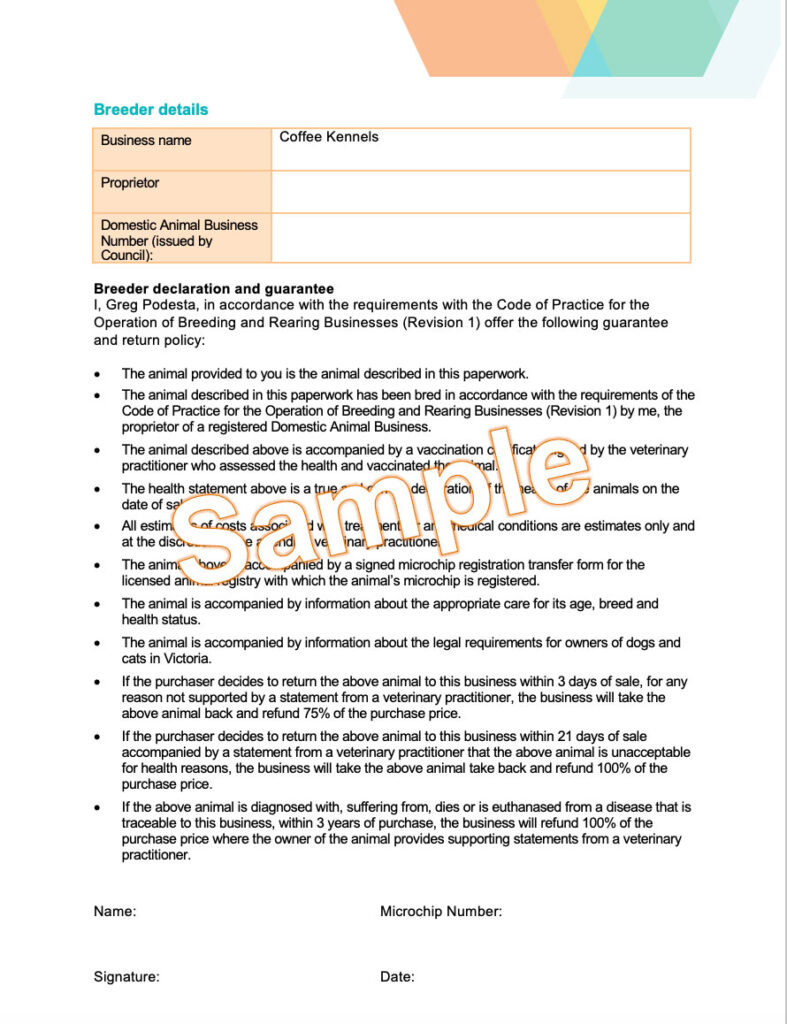
Our Puppy Information Pack contains information on how to care for your Puppy. This includes:
- PREVENTATIVE HEALTH
- VACCINATION
- PARASITES
- ROUTINE PREVENTATIVE HEALTH PROGRAM FOR YOUR PUP (up to 8 weeks)
- FEEDING AND HOUSING
- FEEDING
- HOUSING
- DOG BEHAVIOUR
- INTRODUCTION
- SOCIALISATION PERIOD (5–‐16 weeks of age)
- ADOLESCENCE (4–‐18 months – later in large breeds)
- ADULTHOOD (18 months to 2 years onwards)
- TEACHING GOOD MANNERS
- TRAINING
- HOUSE TRAINING
- OBEDIENCE TRAINING
- PREVENTING PROBLEM BEHAVIOURS
Vaccinations are an important part of caring for your dog as they prevent or reduce the severity of infectious diseases such as canine distemper virus, canine adenovirus, and canine parvovirus, which can cause serious health consequences and even death.
Core and non-core vaccines
Core vaccines are those that all dogs should receive as these protect against potentially fatal diseases. The core vaccines for dogs are canine distemper virus, canine adenovirus and canine parvovirus. They are combined within a single vaccine commonly known in Australia as the C3 vaccine.
Non-core vaccines are those that are administered depending on the risk. This is based on an assessment of the dog’s location, lifestyle, and risk of exposure to the infection. Therefore, it is important to ask your veterinarian about which vaccines are most appropriate for your dog. Non-core vaccines in Australia include those which provide protection against infections caused by canine parainfluenza virus, Bordetella bronchiseptica (these both contribute to kennel cough) and leptospirosis. The canine parainfluenza virus and Bordetella bronchiseptica vaccine (more commonly known together with the core vaccines as a C5 vaccine) is recommended for dogs who regularly come into contact with other dogs, such as on walks, at the park, day-care, puppy preschool, or boarding.
The leptospirosis vaccination is recommended for dogs who are in at-risk areas, have access to stagnant bodies of water, or have contact with livestock or rodents. Leptospirosis is also a zoonotic disease, which means animals, including dogs, can pass the disease on to humans.
Australia is a rabies-free country and thus a rabies vaccine is not necessary for dogs remaining in Australia. If you are planning on taking your dog overseas, you will need to speak to your veterinarian about what vaccinations will be necessary for your dog to travel to and live in the destination country.
Puppy vaccinations
The first core vaccine should be given at 6-8 weeks of age, then a booster vaccine given every 2-4 weeks until 16 weeks of age. The final vaccination should not be given any earlier than 16 weeks of age. The World Small Animal Veterinary Association (WSAVA) provides an example vaccination schedule for a puppy to start at 8 weeks of age, where a 4-week interval between vaccinations would total three puppy vaccinations by 16 weeks of age. A booster vaccine is recommended at 6 months of age to ensure that a protective immune response develops in any dog that may not have responded to any of the first three vaccines.
Puppies should have had all their routine puppy vaccinations before going to public places like the park, to reduce their risk of coming into contact with other dogs or an environment that could be a source of infectious disease. Check with your veterinarian when your puppy will be fully vaccinated, and can safely go to public places. Before your puppy is fully vaccinated you can take them out but you should carry them and limit their exposure to other dogs and areas where dogs might have been. The Australian Veterinary Association advises that puppy preschool properly conducted in a clean environment should not pose a risk to a puppy that is not yet fully vaccinated.
If your veterinarian has recommended the canine parainfluenza virus and Bordetella bronchiseptica vaccine, this is usually given as a single intranasal vaccine (dripped into the nostrils, with the dog’s head held slightly back), with your puppy’s second core C3 vaccine, and then annually. This vaccination can also be given by a needle under the skin (as a single injection mixed with the core vaccines) with the core C3 puppy vaccines in two separate doses, 4 weeks apart (usually with the 2nd and 3rd puppy vaccine), and then annually. Different veterinarians may use different protocols, so it is best to check with your veterinarian which vaccine they use.
If your veterinarian has recommended the leptospirosis vaccine, this is usually given with the core puppy vaccines in two separate doses, 4 weeks apart (usually with the 2nd and 3rd core C3 puppy vaccines), and then annually.
The non-core vaccinations may be given at the same time as a core vaccination, to reduce veterinary visits or alone (for example, if your dog needs to go into boarding at short notice).
Loving! Adorable! Couch Potato! To cut a long story short, it’s a Groodle.
Looking for a complete breed guide about this adorable pup? Keep reading this post to find all answers about this low-shedding designer breed.
It is, in fact, the Goldendoodle’s other name in Australia. It is a Poodle + Golden Retriever mix also known as Golden Poo, Curly Golden and Curly Retriever.

A Groodle is an ideal family dog that creates a strong bond with each family member. If you have planned to get this adorable dog and looking for a comprehensive guide on the breed, you are just in the right place.
In this article, you’ll find every important fact and detail about this breed including features, grooming needs, temperament, health-related issues, pros and cons and much more.
What is a Groodle Dog?
A cross between a Poodle and a Golden Retriever is called a Groodle or a Goldendoodle. Usually, they are known as Goldendoodles in other parts of the world, but Australia has its own charm which is why they are named differently. Currently, they are among the top 10 popular breeds in Australia.
As one of their parent breeds; Poodle comes in different sizes from miniature to large, Groodles too come in various sizes when crossbred with them. So, you can choose a large or a small dog, whatever fits easily in your home.
History and Origin of Groodles:
This dog was first intentionally bred in 1969 by Monica Dickens, the great-granddaughter of Charles Dickens. She wanted to develop a dog with the qualities of both- Poodle and Golden Retriever; which resulted in Groodle. Later, breeders and experts in the United States and Canada bred Golden Retrievers with Standard Poodles specifically to develop a hypoallergenic dog breed for visually impaired people who also had allergies.
What are Groodle’s specialties?
By nature, they are like Golden Retrievers as they are loving and friendly not only with their humans but with everyone. On the other side, they inherit intelligence and a low-shedding coat from Poodles, which is why they make an ideal family dog that is easy to train.
Whether you need an ideal couch dog or pure velcro, Groodle has got your back. It does well with its immediate family, guests, strangers, kids, elders and other pets.
What does a Groodle inherit from its parent breeds?
The Poodle
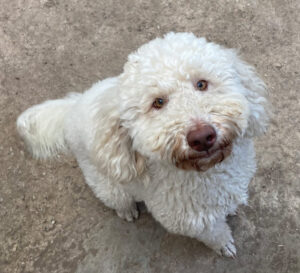
Poodles are clever and elegant. In terms of intelligence, Poodles are ranked the second-most intelligent breed after the Border Collies. Moreover, breeders prefer to crossbreed them with other dogs to develop an intelligent and low-shedding dog.
The poodle is an energetic dog that is easy to train. It is very easy to spend your life with a Poodle because they are not a complex breed neither they are stubborn. Interestingly, most people think that Poodle is a French breed but the fact is that it belongs to Germany. Some other popular Poodle crosses are Bernedoo, Shih Poo, Irishdoodle, Cavapoochon and Cavoodle.
Golden Retriever
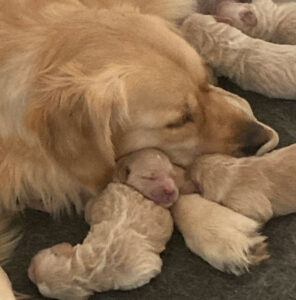
The Golden Retriever is a superstar dog with loads of intelligence, tolerance and joy. It is one of the top 5 dog breeds in the world and the most popular breed in the UK.
They are excellent hunters, sniffers and trackers, which makes them an ideal dog breed for therapy and assistance. Being natural athletic dogs, they always surprise you in dog sports. In short, the Golden Retrievers are a complete package for you.
A Groodle inherits tolerance, friendliness and a wonderful temperament from Golden Retriever which makes it the perfect family dog. Some other popular Golden Retriever crosses are Mountain Doodle, Golden Chi and Golden Dalmatian.
Physical Appearance and Body Features:
Weight and Size: It may grow from 14 to 21 inches in height and can weigh up to 50 pounds. You may expect different sizes and weights in different puppies though.
Colours and Coat: Their coat may resemble any of their parent breeds and they may have either a straight coat or a curled coat. They come in a variety of colours and patterns including Chocolate, Gold, Cream, Gray, Black, Apricot, Red and Brown. Interestingly, a single litter may have different colours of puppies.
Eyes: They mostly have brown or hazel eyes but you should expect some other colours too. Also, the puppies may change their eye colour till the age of 16 weeks.
Lifespan: A Groodle’s lifespan is 12 to 15 years but it may live for a bit longer if it doesn’t develop any serious health issues.
Pros and Cons:
It is good to know about their pros and cons before you get a puppy so you prepare yourself and your home for the new puppy accordingly. Given below are the most common traits to confirm. Let’s start with the Groodle pros.
Pros
> Low-shedding Coat – They may have a low-shedding coat, the breeder may not be able to predict it though. It all depends on the tendency of the parent breed. Dogs with a low-shedding coat are ideal for owners and/or families with allergies.
> Highly social with other pets, strangers and kids – Their friendly attitude toward everyone makes them the best dog for families.
> Easy to train – Their intelligence lets them understand your commands quickly which is why they are easily trainable dogs. But hard work and patience are recommended during the training sessions.
> Easy to maintain – They are not much demanding, plus, their maintenance and grooming are very easy.
Cons
> Daily exercise needed – They need to be exercised regularly. Due to lack of exercise, they may develop health and behaviour issues. So, they are not suitable for busy owners.
> Large-sized Groodle may not feel good in small apartments – Standard Groodle should be kept in homes with backyards so they can play with full authority.
> Separation anxiety – Becomes aggressive and destructive sometimes if left alone.
Generations:
A Goldendoodle or a Groodle has 4 different types of generations. Let’s find facts about them below.
F1 Generation
F1 is the first generation Groodle and is a cross between a pure Poodle and a pure Golden Retriever. That means, they are 50% Poodle and 50% Golden Retriever. They are the healthiest in all the Groodle generations as well as intelligent, loving and highly hypoallergenic.
F1b Generation
F1b is a cross between F1 Groodle and a Poodle so we can say that F1b is 75% Poodle and 25% Retriever. It is more popular than the F1 generation because of its hypoallergenic coat that curlier than the F1. If you are allergic to the dog’s dander and hair, F1b Groodle is an ideal breed for you.
F2 Generation
An F2 is a second-generation dog and is a product of a cross between two F1-generation dogs. They are not much different from F2b Generation
F1 Groodle
The F1 Groodles are an ideal dog breed for owners who are allergic to dog hair.
F2b Generation
An F2b generation may be the mixture of different Groodle generations such as an F1 and F1b or an F2 and F1b. Most of the time, they are hypoallergenic but their appearance and other traits may be a bit different.
Behaviour:
They are friendly, social and intelligent. They inherit their fun-loving trait from Retrievers. You can easily train them and yes, the experts recommend them as one of the best family dogs. They are totally non-aggressive against strangers, children and other animals.
Just like Retriever, they are always ready to please their humans and interact with them during all their activities. Whether you swim, run, exercise or walk, the Groodles have got your back. You’d be shocked to know that they are usually described as “Bomb Proof” because of their temperament and calmness.
Temperament:
A Groodle is considered one of the most gentle dog breeds. Moreover, it’s obedient and friendly. You won’t feel lonely even on the moon if this adorable pup is there to accompany you.
Because of their smartness and intelligence, they are ranked as the 4th smartest dog breed in the 150 smartest breeds. The only drawback of having a Groodle is that they can’t be good guard dogs.
Exercise:
At least 30 minutes of daily exercise is required for Groodles or they may get bored. They love swimming, walking, running, and any activity that will help them burn their energy. Remember, every dog needs exercise, and if not exercised daily, they may develop several problems including harsh behaviour and destructive chewing.
Training:
With plenty of intelligence, they won’t give you a tough time during the training, so they are highly recommended for first-time dog owners. Don’t forget to encourage them with treats during the training sessions. You should try training them from an early age, just some basic training, so they’ll develop the habit of being trained in their adulthood. Along with that make sure you crate train, potty train and socialize them well.
Feeding and Diet:
Well, a balanced diet is necessary for any type of dog from an early age; therefore, a Groodle puppy also deserves the best food for them. The best diet for a Groodle includes vitamins, fats, minerals and proteins.
You may consider feeding them boiled chicken, turkey, white and brown rice, yogurt, eggs and many other foods. Don’t try to feed him raw as it may have bacteria that will affect his health. 1-4 cups of food are enough daily and it should be split into 2-3 meals.
Don’t feed them with the same food every day, try to add some variety and special treats at least once or twice a week.
Grooming:
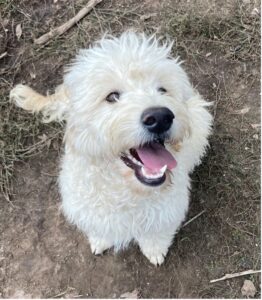
Brush and Bathe: As Groodle doesn’t shed much, you are recommended to brush him at least once a week. Moreover, bathing is not necessary until your dog needs it to get rid of mud after a hike in muddy areas.
Nails: Usually their nails are filed down by themselves if they exercise frequently. Still, their nails should be checked once every month to make sure they aren’t too long.
Ears: It’s good to check their ear twice or thrice a month for any redness, and if found, it may be an infection that should be treated timely.
Requirements for a living:
They like to walk and run, so the owners with a small apartment should avoid getting this pup. The home with a small yard suits them better where they could burn their excessive energy running here and there.
Still, if you have a small apartment and want to get a Groodle, make sure to give them regular exercise and walks. But remember one thing, being a puppy, they spend most of their time sleeping like other breeds, so don’t get worried about that.
Moreover, they can easily be adjusted to all types of families including kids, elders, and other pets.
Health Issues:
The crossbred dogs may inherit health-related issues from their parent breeds, likewise, Groodles may also develop some illnesses. Moreover, if their parent breeds are not screened well before the cross, that too can lead to genetic problems. Given below are some of the major health concerns a Groodle may have:
Epilepsy: Groodles may be easy victims of epilepsy because both of their parent breeds are prone to it. If suffering from epilepsy, the dog usually shows odd behaviour and may collapse because of the severe conditions. It’s recommended to see your vet immediately if you witness these symptoms.
Separation Anxiety: They love their owners like anything but sometimes they may suffer separation anxiety if their owners leave them for a short or long period. The common symptoms of separation anxiety are excessive barking, growling, destructive chewing and aggressive behaviour.
Hip and Elbow Dysplasia: Both of these conditions are usually inherited from their parent breeds. Hip dysplasia is a condition in which the dog’s thigh bone does not fit into the socket while Elbow dysplasia may develop when the elbow joint has some growth disturbance.
von Willebrand’s Disease: It’s a blood clotting disorder that may lead to severe bleeding if they meet an accident or after major surgery.
Necessary Health Testing Requirements:
To avoid any health or genetic issues in the puppies, it is very important to do some tests of both the parent breeds, as well as, Groodle puppies. Usually, a good breeder will do the following health tests.
Health Tests for Poodles (Before breeding):
- Von Willebrand disease I and II
- Hip and Elbow Dysplasia
- Degenerative Myelopathy
- Heart Diseases
- Osteochondrodysplasia
- Progressive Rod-Cone Degeneration
- GM2 Gangliosidosis
Health Tests for Golden Retrievers (Before breeding):
- Hip and Elbow Dysplasia
- Ichthyosis
- Progressive Rod-Cone Degeneration
- Dystrophic Epidermolysis Bullosa
- Heart Diseases
- Sensory Ataxic Neuropathy
- Progressive Retinal Atrophy – Golden Retriever Type 1 and Type 2
Health Tests for Groodles:
- Hip and Elbow Dysplasia
- Neonatal Encephalopathy with Seizures
- Von Willebrand disease I and II
- Degenerative Myelopathy
- Progressive Retinal Atrophy – Golden Retriever Type 1 and Type 2
- PRA, Progressive Rod-Cone Degeneration
As a Therapy Dog:
Like Poodles, they come in a variety of sizes and can easily be adjusted with any type of house. They are affectionate, extra-smart and loving. Also, an ideal therapy dog should have several qualities such as the desire to please, trainability, loyalty, patience and temperament. And Groodles have all such qualities so they can become ideal therapy dogs for owners of all ages that have special needs.
Deposit Terms and Conditions
To secure a Coffee Kennels Puppy, a $500 nonrefundable deposit is required. This deposit holds your spot on our waiting list, and ensures you can acquire a puppy from the litter of your choice.
- Puppy Selection – After placing a deposit you will be allocated a choice order allocation. Puppy choices will be conducted once the puppies are six weeks old and will be conducted at Coffee Kennels (or via video call if you cannot attend in person). Dates and times will be allocated about a month before visits. Visits appointments are one-hour blocks. There will be appointments before and after you so your punctuality is appreciated.
- Coffee Kennels cannot guarantee that a specific sex or size will be available for you in the litter of choice. If you are after a specific size or sex and it is not available, you will be put to the next in line of the upcoming litter.
- Coffee Kennels reserves the right to refuse a home our puppies if any member of the Coffee Kennels team deems it unsuitable. In this case your deposit will be refunded. There will be no grounds for appeal, and reasons won’t necessarily be discussed.
- Balance of payment is due before collection of your puppy. Your funds must be cleared into the Coffee Kennels account before your puppy can leave our premises.
- Microchip transfer will be performed electronically. Personal details must be completed in full before your puppy leaves Coffee Kennels premises. A signature is required within these details.
